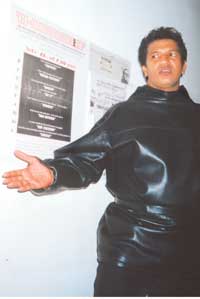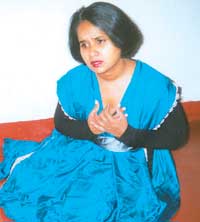| Plus |
|
|||
|
Making our own Hamlet
After thirteen years of slumber, Hamlet - a Sinhala Transcreation co-directed by Gamini Haththotuwegama and Haig Karunaratne prepares once more to take the stage. First performed in 1990, with a script co-written by Lakshman Fernando, Gamini Fonseka Edirisinghe and Gamini Haththotuwegama, this was hailed as one of the best translations of Shakespeare. This time round there’s a new cast, with Hasinee Halpe (Ophelia) and Gamini Haththotuwegama (Claudius) being the only members of the original cast. Why 'transcreation'?
Says Haththotuwegama on the way in which they approached the script, "It is up to us to take the text and work in our own responses to the text and our present situation. Shakespeare himself in writing the play was responding to his own time and situation; so must we." The production brings together a diverse group of actors hailing from all parts of the country. There are cast members who travel from Colombo, Horana, Kandy, Nittambuwa, Thalawathugoda, Hokandara and Gampaha. This makes rehearsals difficult to co-ordinate because sometimes when half the cast has arrived the other actors are still "on the way". Yet despite the logistical issues the cast continues exploring various strategies to avoid complications like Karunaratne's "total theatre concept" where the cast lives together, rehearses, cooks together and most importantly eats together bringing them closer as a community, which becomes an advantage when they maintain that bond on stage. With a cast of around 30 actors, organizing and management is not easy, yet as the primary objective of the directors is to train new actors, the effort for both of them was worthwhile. Says Haththotuwegama: "When the idea of staging the play for the Lionel Wendt Theatre Festival came up we thought of going with the original cast, but since we could not get the cast together we decided to train new people." Thus, The Groundlings who present Hamlet this time around comprises actors from Haththotuwegama's Wayside and Street Theatre Group, actors who have taken part in Sinhala theatre and actors from other street theatre groups. The acting process itself started off with workshops and training sessions which saw the new cast respond well to the play. The name of the group, The Groundlings comes from Shakespeare’s time; The ordinary folk who stood around the stage and watched the play were called groundlings. To Haththotuwegama it describes the diverse cross- section of actors in the group and is also apt in terms of its connection with Shakespearean times. To Karunaratne it serves a greater purpose for the future - "We should think in terms of making more of Shakespeare our own. I hope we have put together a group that will be able to do this." Corresponding with the objective of bringing together new talent, the theme of this production plays up the role of youth. Says Haththotuwegama, "We focus on how young people get involved and get through crisis situations. Hamlet was not just an individual who could not make up his mind; he was a youth facing a crisis and what is interesting about the play is his response to the crisis." Playing the role of Hamlet is 24-year-old Chamaru Pathirana, a student specializing in media at the Sri Palee Campus, Horana, who joined one of Haththotuwegama's workshops in 1999 and has been with the group ever since. “Hamlet,” says Chamaru, “was a youth who was forced to get involved in politics. I approach Hamlet as a youth, a politician, while bringing in undertones of today’s problems. He embodies the modern day youth and I can bring my own experience into the character." Experienced in Street Theatre Technique, he feels that formal theatre can benefit from the inclusion of some aspects of street drama. On the idea of community living he felt that it helps the actor. "All of us have our own problems to deal with, but here we meet them together and move forward with our work while helping each other." Roshan Rupasinghe agrees. He plays three roles in the play of which the principal role is that of Rosencrantz. "Playing three roles is not an issue," he says, "because they take place in blocks; what I need to pay attention to are costume changes and entrances." Also taking part as one of the 'gravediggers', he feels that the gravedigger's scene is one that is integral to the play. This rendition
of Hamlet expands the scene to include four gravediggers instead
of two and taking off from the original script interrogates issues
of the working class. "It's a story for all times," says Karunaratne, "because it's the story of the human family. But each time it's performed it becomes a new play because of the present realities worked into the production. It's a play which hopes to prompt an audience deadened by TV and film to respond in a primordial sense, to think... to feel." RP Hamlet - A Sinhala Transcreation will be on at the Lionel Wendt on November 14. |
||||
Copyright © 2001 Wijeya Newspapers Ltd. All rights reserved. |

